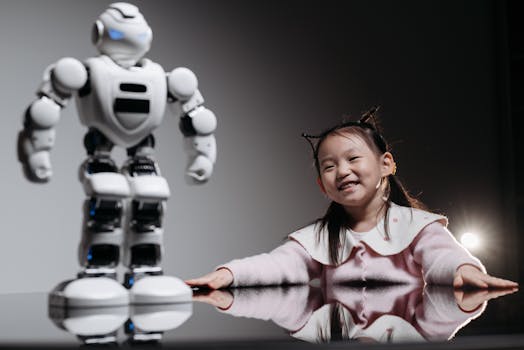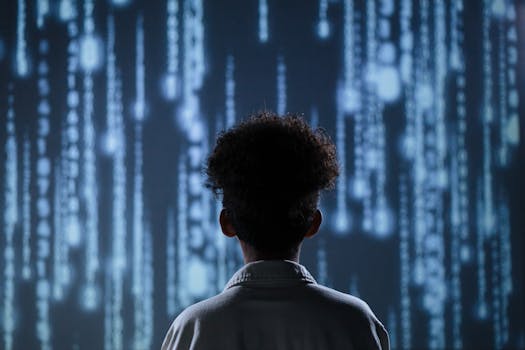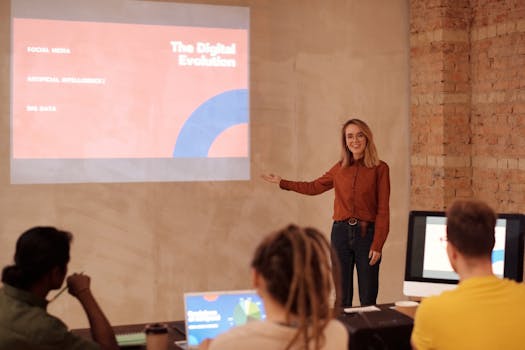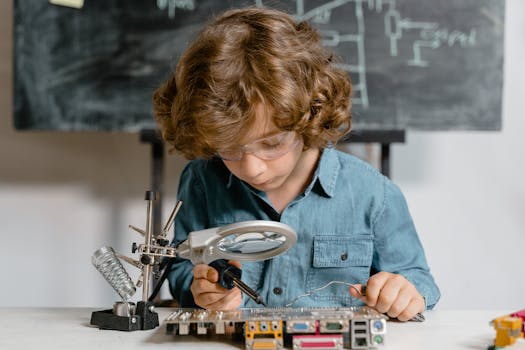
The Future of Education: What 2025 Holds
Introduction to the Future of Education

The future of education is rapidly changing, with technology and innovation leading the way. In 2025, we can expect significant advancements in online learning, artificial intelligence, and personalized education. The Focus Keyword Future of Education will be the key to understanding the upcoming trends and developments in the education sector. As we move forward, it’s essential to consider how these changes will impact the way we learn, teach, and interact with each other.
Advancements in Online Learning

One of the most significant trends in the future of education is the rise of online learning. With the help of technology, students can now access high-quality educational content from anywhere in the world. Online learning platforms, such as MOOCs (Massive Open Online Courses), will continue to grow in popularity, offering students a flexible and affordable way to learn. Additionally, artificial intelligence will play a crucial role in enhancing the online learning experience, providing personalized recommendations and adaptive assessments.
Artificial Intelligence in Education

Artificial intelligence will revolutionize the education sector in 2025. AI-powered tools will help teachers with grading, feedback, and student assessment, freeing up more time for hands-on teaching and mentorship. Furthermore, AI-driven adaptive learning systems will enable students to learn at their own pace, providing real-time feedback and adjusting the difficulty level of course materials accordingly.
Personalized Education

Personalized education will become increasingly important in 2025. With the help of data analytics and machine learning, educators will be able to create customized learning plans tailored to each student’s needs, abilities, and learning style. This approach will not only improve student outcomes but also increase student engagement and motivation. Moreover, personalized education will enable teachers to identify knowledge gaps and provide targeted support, ensuring that every student reaches their full potential.
Conclusion

In conclusion, the future of education in 2025 will be shaped by technology, innovation, and a commitment to providing high-quality, personalized learning experiences. As we look to the future, it’s essential to consider the potential challenges and opportunities that these changes will bring. By embracing the latest advancements in online learning, artificial intelligence, and personalized education, we can create a more inclusive, effective, and inspiring education system for all.
The Role of Teachers in the Future of Education

The role of teachers will continue to evolve in 2025. While technology will augment the teaching process, human teachers will remain essential for providing emotional support, guidance, and mentorship. Teachers will need to develop new skills, such as data analysis and digital literacy, to effectively integrate technology into their teaching practices. Moreover, teachers will need to be adaptable and flexible, willing to experiment with new approaches and methodologies to meet the changing needs of their students.
The Impact of Technology on Student Learning

Technology will have a profound impact on student learning in 2025. With the help of digital tools, students will be able to access a vast array of educational resources, collaborate with peers, and engage in interactive learning experiences. Additionally, technology will enable students to take ownership of their learning, setting goals, tracking progress, and reflecting on their achievements. However, it’s essential to ensure that technology is used in a way that complements traditional teaching methods, rather than replacing them.
Virtual and Augmented Reality in Education

Virtual and augmented reality will become increasingly important in education in 2025. These technologies will enable students to explore complex concepts, simulate real-world scenarios, and interact with 3D models. Virtual and augmented reality will also provide students with immersive, engaging learning experiences, increasing motivation and enthusiasm for learning. Moreover, these technologies will enable teachers to create customized, interactive lesson plans, tailored to the needs of their students.
Accessibility and Inclusion in Education

Accessibility and inclusion will be critical considerations in the future of education in 2025. Technology will play a key role in providing equal access to education for students with disabilities, language barriers, and other challenges. Moreover, educators will need to prioritize cultural sensitivity, diversity, and inclusivity, creating learning environments that value and respect the diverse backgrounds and experiences of all students. By promoting accessibility and inclusion, we can ensure that every student has the opportunity to succeed and reach their full potential.
Conclusion

In conclusion, the future of education in 2025 will be shaped by a commitment to providing high-quality, personalized, and inclusive learning experiences. By embracing the latest advancements in technology, artificial intelligence, and virtual and augmented reality, we can create a more effective, efficient, and inspiring education system for all. As we look to the future, it’s essential to prioritize accessibility, inclusion, and cultural sensitivity, ensuring that every student has the opportunity to succeed and reach their full potential.
The Future of Education: Challenges and Opportunities

The future of education in 2025 will be marked by both challenges and opportunities. One of the significant challenges will be ensuring that all students have access to the latest technology and digital tools, regardless of their socioeconomic background or geographical location. Additionally, educators will need to address concerns around data privacy, cybersecurity, and the potential for technology to exacerbate existing inequalities.
Preparing for the Future of Education

To prepare for the future of education in 2025, educators, policymakers, and stakeholders must work together to create a comprehensive strategy for innovation and reform. This will involve investing in teacher training and professional development, upgrading infrastructure and technology, and promoting partnerships between education institutions, industry, and government. Moreover, it’s essential to prioritize research and development, exploring new technologies, methodologies, and approaches to teaching and learning.
Conclusion

In conclusion, the future of education in 2025 will be shaped by a complex interplay of technological, social, and economic factors. While there will be challenges to overcome, there will also be opportunities for innovation, growth, and transformation. By working together and embracing the latest advancements in technology, artificial intelligence, and personalized education, we can create a brighter, more inclusive, and more inspiring future for all learners.
The Future of Education: A Global Perspective

The future of education in 2025 will be a global phenomenon, with countries and cultures around the world contributing to the development of new technologies, methodologies, and approaches to teaching and learning. It’s essential to recognize that education is a global common good, requiring international cooperation, collaboration, and knowledge-sharing to address the complex challenges and opportunities that lie ahead.
Global Partnerships and Collaborations

Global partnerships and collaborations will be critical to the future of education in 2025. Educators, researchers, and policymakers will need to work together to share best practices, develop common standards, and address the global challenges facing education. Moreover, international collaborations will enable the development of new technologies, platforms, and resources, providing students and teachers with access to a global network of knowledge, expertise, and support.
Conclusion

In conclusion, the future of education in 2025 will be a global, interconnected, and interdependent phenomenon. By recognizing the importance of international cooperation, collaboration, and knowledge-sharing, we can create a more inclusive, equitable, and effective education system for all. As we look to the future, it’s essential to prioritize global citizenship, cultural competence, and linguistic diversity, ensuring that every student is prepared to succeed in an increasingly complex, interconnected world.
The Future of Education: A Call to Action

The future of education in 2025 requires a call to action, urging educators, policymakers, and stakeholders to work together to create a brighter, more inspiring future for all learners. It’s essential to prioritize innovation, experimentation, and risk-taking, embracing the latest advancements in technology, artificial intelligence, and personalized education. Moreover, we must recognize the importance of accessibility, inclusion, and cultural sensitivity, ensuring that every student has the opportunity to succeed and reach their full potential.
A Future of Education that Works for All

A future of education that works for all will require a fundamental transformation of the education system, prioritizing student-centered, personalized, and inclusive learning experiences. It’s essential to recognize that every student is unique, with their own strengths, challenges, and learning style. By providing students with the skills, knowledge, and support they need to succeed, we can create a more equitable, just, and prosperous society for all.
Conclusion

In conclusion, the future of education in 2025 will be shaped by a commitment to providing high-quality, personalized, and inclusive learning experiences. By working together, embracing innovation and technology, and prioritizing accessibility and cultural sensitivity, we can create a brighter, more inspiring future for all learners. The future of education is a collective responsibility, requiring the active engagement and participation of educators, policymakers, stakeholders, and students themselves.
The Future of Education: Embracing the Unknown

The future of education in 2025 will be marked by uncertainty, ambiguity, and rapid change. It’s essential to recognize that the future is inherently unpredictable, and that our predictions and forecasts may not always come to pass. However, by embracing the unknown, being open to new ideas and perspectives, and prioritizing creativity, imagination, and innovation, we can create a more agile, adaptable, and resilient education system.
Conclusion

In conclusion, the future of education in 2025 will be a complex, dynamic, and ever-changing phenomenon. By embracing the unknown, prioritizing innovation and creativity, and recognizing the importance of accessibility, inclusion, and cultural sensitivity, we can create a more inspiring, effective, and equitable education system for all. As we look to the future, it’s essential to remain open-minded, curious, and committed to providing high-quality, personalized learning experiences that prepare students for success in an increasingly complex, interconnected world.





